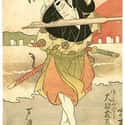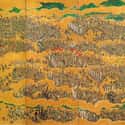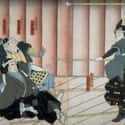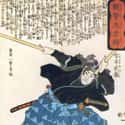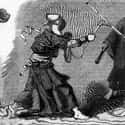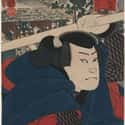-
(#3) He Defeated A Master Swordsman With A Wooden Sword Carved From An Oar
In Musashi's most famous duel, he faced off against Sasaki Kojiro, also known as the Demon of the West. Kojiro was the ideal samurai in many ways: he was highly respected and classically trained in the Chujō-ryū school, and he was the creator and head of the Ganryū school of sword fighting. Kojiro used the longer-than-usual no-dachi two-handed sword in his technique to give himself superior range.
The duel was set for the morning of April 13, 1612, on the island of Funashima (now called Ganryū after Kojiro's famous fighting style). When the time came, however, Musashi was nowhere to be found. Kojiro and the officials sent to observe the fight were left waiting for hours. When Musashi finally arrived, intentionally late, he was disheveled and holding a bokken (a wooden sword) he had fashioned from an oar he found on the boat ride to the duel. Making opponents wait was a psychological tactic integral to Musashi's battle strategy.
Kojiro was furious about this display of disrespect. He is said to have cast aside his sheath in anger, to which Musashi responded, "If you have no more use for your sheath, you are already dead." Musashi had carved his bokken to be several inches longer than Kojiro's no-dachi, negating Kojiro's primary advantage and enabling Musashi's victory.
-
(#6) He Swore Off War After The Second Massive Battle At The Castle Of Osaka
In 1614, Tokugawa Ieyasu was effectively the ruler of Japan. His son was shogun – a hereditary commander-in-chief – though Ieyasu was pulling the strings. There was only one potential rival to his hegemony: the son of the previous leader of Japan, Toyotomi Hideyori. Hideyori's father, Hideyoshi, unified Japan and even invaded Korea. Upon Hideyoshi's end, Hideyori was slotted to take his place. Tokugawa Ieyasu prevented this, but Hideyori's existence still posed a problem.
In the winter of 1614, Ieyasu marched 200,000 men to surround Hideyori's stronghold at Osaka Castle. Even with overwhelming numbers, Ieyasu was unable to take the castlel; he did, however, persuade Hideyori to sign a treaty ending the fight. Ieyasu reneged in the summer of 1615 and besieged the castle again. This time, weakened and partially disarmed by the treaty, the castle fell.
Musashi fought in both the winter and summer battles, though historians disagree on which side. Some claim he fought the winter battle on the side of the Toyotomi Hideyori and the summer battle on the side of the Tokugawa Ieyasu. Afterward, Musashi decided to never kill again.
-
(#2) He Was Undefeated In 60 Duels
Duels in early 17th-century Japan were often fatal. Miyamoto Musashi spent a large portion of his life traveling across Japan engaging in duels, slaughtering many master duelists along the way. Through this campaign of continual combat, Musashi perfected his skills and rose to become the greatest swordsman in Japanese history.
Not only did Musashi risk his life during his various duels, he also served in several battles. He wrote in A Book of Five Rings,
"Generally speaking, the Way of the warrior is resolute acceptance of death.
In my strategy, the training for killing enemies is by way of many contests, fighting for survival, discovering the meaning of life and death, learning the Way of the sword, judging the strength of attacks and understanding the Way of the 'edge and ridge' of the sword."
-
(#5) At Age 21, He Defeated Two Sword Masters In Quick Succession
When Musashi Musashi arrived in Kyoto in 1604, he was unknown; he was determined, however, to make a name for himself. To do so, he challenged Yoshioka Seijuro of the Yoshioka Clan to a duel.
The Yoshioka clan were swordfighting teachers who had tutored members of the powerful Ashikaga clan for four generations, running one of the eight great sword schools in Kyoto. They taught using the Yoshioka Ryu style. Musashi might not have even secured a duel with them were it not for his father's reputation as a skilled swordsman.
On the morning of the duel, Musashi purposefully arrived late to anger his opponent. This strategy proved successful – Musashi won handily, breaking Seijuro's arm with his bokuto. Seijuro was so dishonored, he quit swordsmanship and became a Zen monk.
Seijuro's brother, Yoshioka Denshichiro, challenged Musashi to a duel to restore his clan's honor; as such, the duel was to be fatal. Again, Musashi arrived late. Using a bokuto, he ended Denshichiro with a single blow to the head.
-
(#8) He Fought Against – And Defeated – Masters Of Every Weapon
Musashi didn't just fight swordsmen in duels; he purposefully sought out masters of every weapon. In 1607, he sought out an undefeated master of the kusarigama (sickle and chain) named Shishido Baiken. According to legend, Baiken struck first with the chain, dulling and bending Musashi's blade. As the two drew close to one another, Musashi pulled out his short sword, usually only used in ritual suicide. Baiken hesitated, providing Musashi with the opportunity to drive the short sword into Baiken. With his last breath Baiken whispered, "Thank you."
Later that same year, Musashi defeated Muso Gonnosuke who was a master of jojutsu (a short staff technique). At the time, Gonnosuke had allegedly never lost a duel. Since the two agreed to battle with wooden swords, Gonnosuke survived, despite his defeat. Gonnosuke spent years training for a rematch, only for Musashi to win again.
In A Book of Five Rings, Musashi wrote, "You should not have a favorite weapon. To become over-familiar with one weapon is as much a fault as not knowing it sufficiently well."
-
(#14) He Left Home At A Young Age To Live With His Uncle, A Buddhist Monk
In 1584, Shinmen Musashi was born in Miyamoto village to a samurai family. His mother perished during childbirth, and his father, Shinmen Munisai, was an expert swordsman and served as Musashi's first teacher. Munisai was harsh and strict, especially toward his young son.
When Musashi was either nine or ten, he went to live with his uncle. Some accounts claim his father abandoned him, while others say he was killed in a duel. Some think Musashi simply ran away. In any case, Musashi took little else from his father but his name and the basic techniques of the samurai.
Musashi's uncle Dorin was a monk from the Shoreian temple in Miyamoto. At the temple, Musashi learned Zen Buddhism, reading, and writing. He continued to hone his swordsmanship until he left the temple to become a shugyosha (wandering samurai in training) at some point between the ages of 16 and 20.
New Random Displays Display All By Ranking
About This Tool
The identity of a Japanese samurai is a hereditary heritage, not a profession. Some samurais are also very prestigious scholars, and they can also serve as civil and military administrators, clergy, painters, and aestheticians. There were many famous samurai in history, the greatest should be Musashi Miyamoto. He was a famous swordsman at the end of the Sengoku period in Japan and became famous for his superb swordsmanship and achievements.
Miyamoto Musashi lived in a turbulent historical period, but he devoted himself to the study of warfare and swordsmanship and made great achievements. The random tool shares 14 facts about the violent life of this greatest samurai.
Our data comes from Ranker, If you want to participate in the ranking of items displayed on this page, please click here.











